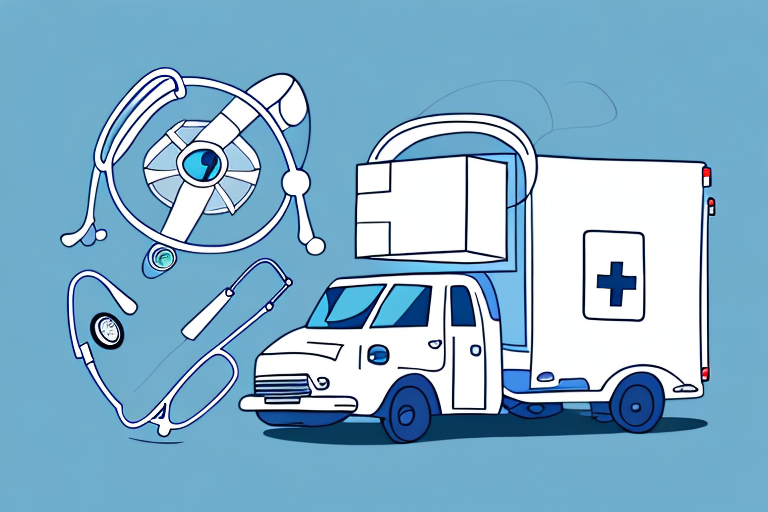Introduction to a Career as a Medical Courier
If you are considering a career as a medical courier, then you have come to the right place. This comprehensive guide provides an in-depth analysis of the role, including responsibilities, required education and qualifications, essential skills, types of deliveries, best practices for handling medical supplies, compliance with regulations, industry outlook, career tips, challenges, job opportunities, salary expectations, and available training programs and certifications.
The Role and Importance of Medical Couriers in Healthcare
Responsibilities of a Medical Courier
As a medical courier, you are responsible for the transportation of medical supplies, such as blood, drugs, specimens, and medical equipment, between healthcare facilities, laboratories, and pharmacies. Your primary role is to ensure that these supplies are delivered safely, securely, and on time, maintaining their quality and integrity throughout the transport process.
You may interact with healthcare professionals, laboratory technicians, or pharmacy staff to ensure the correct supplies are delivered to the right place at the right time. Additionally, you must follow specific protocols or procedures to comply with regulatory requirements, such as HIPAA or OSHA.
Importance and Impact in Healthcare
Medical couriers play a crucial role in the healthcare industry by ensuring the safe and timely delivery of vital medical supplies, including life-saving medications, organs for transplant, and diagnostic specimens. According to the U.S. Bureau of Labor Statistics, the demand for medical couriers is growing due to the increasing need for efficient healthcare delivery systems.
By adhering to strict protocols and using specialized equipment and packaging, medical couriers help reduce the risk of contamination, damage, or loss of medical supplies, thereby supporting the smooth functioning of medical facilities and the delivery of quality patient care.
Types of Deliveries Handled
- Blood and blood products
- Medical specimens, such as urine, saliva, or tissue samples
- Medications, including controlled substances
- Medical equipment, such as infusion pumps or oxygen tanks
- Organ and tissue transplants
- Documents and paperwork, such as lab reports or patient records
Education, Qualifications, and Certifications
Educational Requirements
While there are no specific educational requirements for becoming a medical courier, most employers prefer candidates who have a high school diploma or equivalent. A valid driver's license and a clean driving record are typically required. Some employers may also conduct background checks, drug testing, and require immunization records.
Training Programs and Certifications
Obtaining specialized training and certifications can enhance your qualifications and job prospects. Relevant certifications include:
- Transportation Specialist Certification (TSC) from the National Institute for Automotive Service Excellence (ASE)
- Bloodborne Pathogens Certification from the Occupational Safety and Health Administration (OSHA)
- Hazardous Materials Handling Certification from the Department of Transportation (DOT)
- Courier and Logistics Certification (CLC) from the Professional Messenger and Courier Association (PMCA)
Essential Skills for Medical Couriers
Organizational and Time Management Skills
Medical couriers must excel in managing their time and organizing their tasks efficiently to ensure the timely delivery of critical medical supplies. This involves planning routes, prioritizing deliveries, and adhering to strict schedules.
Communication and Interpersonal Skills
Strong communication skills are essential for interacting effectively with healthcare professionals, laboratory staff, and pharmacy personnel. Couriers must convey information clearly and professionally to ensure accurate deliveries.
Navigation and Technical Skills
Proficiency in navigation is crucial for medical couriers. This includes knowledge of local roads and traffic patterns, as well as the ability to use GPS and other navigation tools to optimize delivery routes.
Physical Fitness and Attention to Detail
Medical couriers must be physically fit to handle the lifting and maneuvering of medical supplies. Attention to detail is also critical to ensure that deliveries are accurate and that medical materials are handled properly.
Best Practices and Compliance
Handling and Transporting Medical Supplies
- Properly label and package medical supplies according to relevant guidelines and protocols.
- Use specialized containers or packaging materials, such as coolers or temperature-controlled boxes, for perishable items.
- Follow specific protocols for handling biohazardous materials or controlled substances.
- Ensure that all paperwork and documentation are complete and accurate.
- Regularly clean and disinfect the transport vehicle to maintain hygiene standards.
Ensuring HIPAA Compliance
Medical couriers may handle patient health information, which is protected under HIPAA regulations. To ensure compliance:
- Secure any patient data or protected health information (PHI) appropriately.
- Use secure transport methods for any PHI, such as certified mail or encrypted digital files.
- Adhere to protocols for the disposal of PHI or protected documents.
- Stay informed about potential risks of data breaches and implement measures to mitigate them.
Career Outlook and Advancement
Future Industry Trends
The medical courier industry is expected to grow significantly in the coming years. The U.S. Bureau of Labor Statistics projects a steady increase in demand due to the aging population and the rise of chronic diseases. Additionally, advancements in technology, such as GPS tracking and real-time delivery notifications, are enhancing the efficiency and effectiveness of medical courier services.
Salary Expectations
Salary expectations for medical couriers vary based on factors such as location, employer, and experience. According to Payscale, the average hourly rate for a medical courier is $14.65, with a range of $10.41 to $20.15 per hour. Experienced medical couriers can earn up to $24 per hour.
Tips for Career Excellence
- Stay updated with the latest regulations and guidelines for transporting medical supplies.
- Develop strong communication and interpersonal skills to interact effectively with healthcare professionals.
- Invest in training and certifications to enhance your skills and knowledge.
- Be reliable, punctual, and diligent in your work.
- Continuously improve your organizational and time management skills to ensure efficient deliveries.
Challenges and Solutions
Common Challenges
- Traffic congestion and adverse weather conditions can delay deliveries.
- Navigating tight spaces or hospital corridors can be difficult.
- Exposure to biohazardous materials poses health risks.
- Maintaining compliance with ever-changing regulations can be complex.
Strategies to Overcome Challenges
To address these challenges, medical couriers should:
- Plan routes carefully using navigation tools to avoid traffic and optimize delivery times.
- Maintain clear communication with healthcare facilities to anticipate and navigate spatial constraints.
- Use appropriate protective equipment and follow safety protocols when handling biohazardous materials.
- Stay informed about regulatory changes and undergo regular training to ensure compliance.
Finding Job Opportunities as a Medical Courier
There are several avenues to explore when searching for job opportunities as a medical courier:
- Visit the career pages of healthcare facilities, laboratories, and pharmacies.
- Check online job boards such as Indeed and Monster for available positions.
- Register with local staffing agencies that specialize in healthcare positions.
- Network with professionals in the healthcare and logistics industries to learn about unadvertised opportunities.
Conclusion
A career as a medical courier is both challenging and rewarding, offering the opportunity to play a vital role in the healthcare system. Medical couriers are responsible for the safe, secure, and timely transport of essential medical supplies, requiring a combination of organizational skills, attention to detail, and adherence to regulatory standards. With the industry's promising outlook and opportunities for advancement through certifications and specialized training, pursuing a career as a medical courier can lead to a fulfilling and dynamic professional path.




















